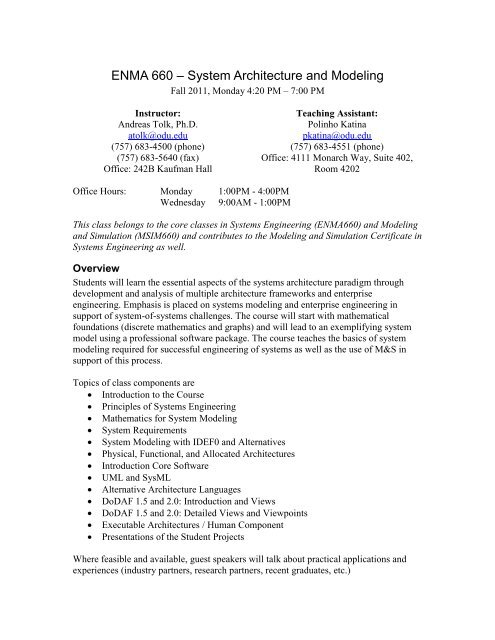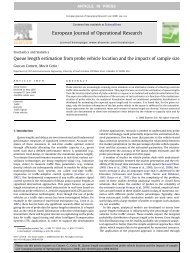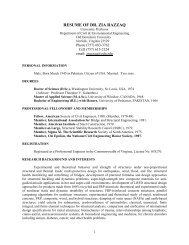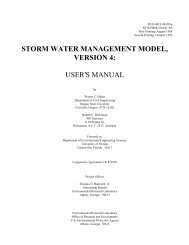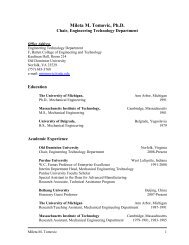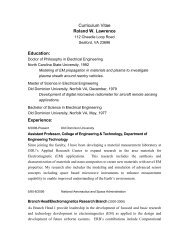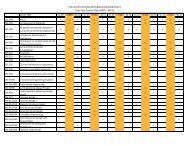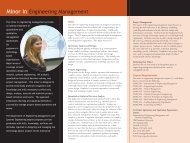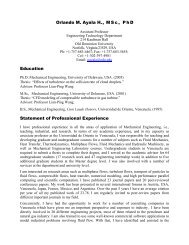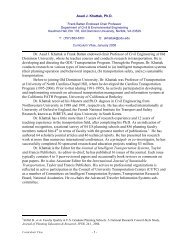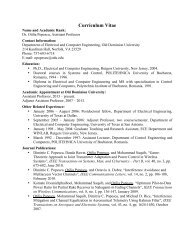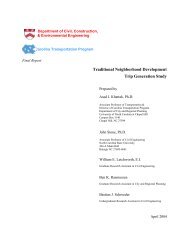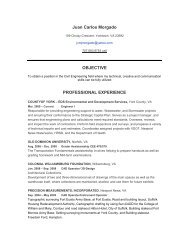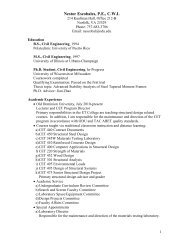Syllabus
Syllabus
Syllabus
Create successful ePaper yourself
Turn your PDF publications into a flip-book with our unique Google optimized e-Paper software.
ENMA 660 – System Architecture and Modeling<br />
Fall 2011, Monday 4:20 PM – 7:00 PM<br />
Instructor:<br />
Andreas Tolk, Ph.D.<br />
atolk@odu.edu<br />
(757) 683-4500 (phone)<br />
(757) 683-5640 (fax)<br />
Office: 242B Kaufman Hall<br />
Teaching Assistant:<br />
Polinho Katina<br />
pkatina@odu.edu<br />
(757) 683-4551 (phone)<br />
Office: 4111 Monarch Way, Suite 402,<br />
Room 4202<br />
Office Hours: Monday 1:00PM - 4:00PM<br />
Wednesday 9:00AM - 1:00PM<br />
This class belongs to the core classes in Systems Engineering (ENMA660) and Modeling<br />
and Simulation (MSIM660) and contributes to the Modeling and Simulation Certificate in<br />
Systems Engineering as well.<br />
Overview<br />
Students will learn the essential aspects of the systems architecture paradigm through<br />
development and analysis of multiple architecture frameworks and enterprise<br />
engineering. Emphasis is placed on systems modeling and enterprise engineering in<br />
support of system-of-systems challenges. The course will start with mathematical<br />
foundations (discrete mathematics and graphs) and will lead to an exemplifying system<br />
model using a professional software package. The course teaches the basics of system<br />
modeling required for successful engineering of systems as well as the use of M&S in<br />
support of this process.<br />
Topics of class components are<br />
Introduction to the Course<br />
Principles of Systems Engineering<br />
Mathematics for System Modeling<br />
System Requirements<br />
System Modeling with IDEF0 and Alternatives<br />
Physical, Functional, and Allocated Architectures<br />
Introduction Core Software<br />
UML and SysML<br />
Alternative Architecture Languages<br />
DoDAF 1.5 and 2.0: Introduction and Views<br />
DoDAF 1.5 and 2.0: Detailed Views and Viewpoints<br />
Executable Architectures / Human Component<br />
Presentations of the Student Projects<br />
Where feasible and available, guest speakers will talk about practical applications and<br />
experiences (industry partners, research partners, recent graduates, etc.)
Every student will have access to the Vitech Software CORE 5.0. This software is needed<br />
for homework assignment and the in-class project.<br />
Objectives<br />
The student will be exposed to the fundamental methods and techniques for system<br />
modeling and architecting. He will be introduced to supporting frameworks and standards<br />
and learn about their strengths and shortcomings. At the end of the course, the student<br />
should understand which methods and techniques can be used to support modeling and<br />
architecture of complex system, virtual systems, and system-of-systems.<br />
Text and Class Material<br />
For the introduction and theoretic sections, the following textbook is mandated:<br />
<br />
Dennis M Buedde (2009) The Engineering Design of Systems, Models and<br />
Methods, 2 nd Ed. Wiley Series in Systems Engineering, John Wiley and Sons, Inc.<br />
(The 2000 1 st Edition can alternatively be used)<br />
Additional reading assignments will be distributed during classes where necessary.<br />
For the practical examples, the academic version of CORE 5.0 of Vitech Corporation is<br />
necessary. It will be addressed in class how to obtain and install this software.<br />
Access to Blackboard (http://blackboard.odu.edu) is mandatory. Additional course<br />
materials, handouts, slides, etc. will be available via Blackboard.<br />
Broadcasts will be supported by Adobe Connect, but presence in the classroom is<br />
mandatory for the Interim Examination and recommended for the Introduction of the<br />
CORE software.<br />
Examinations, Homework Assignments, Projects<br />
<br />
<br />
<br />
<br />
<br />
8 Homework assignments are given via Blackboard and have to be completed<br />
within a week.<br />
An in class interim examination (closed book, closed notes) will be conducted<br />
October 17, 2011<br />
Each student will contribute to a team project using the CORE 5.0 software for an<br />
architecting assignment. This will be a team grade based on a project plan that is<br />
part of the project.<br />
The final examination is a take home examination that will be distributed on<br />
November 28, 2011 and that needs to be finalized by December 12, 2011<br />
PhD and Dr. Eng. students have to submit a paper (app 5,000 words) on a special<br />
topic of interest to be presented during the Capstone Conference in Spring 2012<br />
or a similar conference (ASEM, SpringSim, etc.) to qualify for an 800 level<br />
credit.
Grading Distribution<br />
PhD and Master students will be graded based on the following efforts<br />
(100 points total):<br />
20% Interim Examination<br />
20% Final Examination<br />
30% Project Contribution<br />
30% Homework<br />
PhD and Dr.Eng. students have to pass the paper.<br />
As a rule, no extra points will be given.<br />
Grading Scale<br />
Grade Points Grade Points Grade Points<br />
A 95-100 A- 90-94<br />
B+ 87-89 B 83-86 B- 80-82<br />
C+ 77-79 C 73-76 C- 70-72<br />
F
AUG SEP OCT NOV DEC<br />
1 Massac. 1 1 29-Aug Introduction / Systems Engineering HW1<br />
2 2 2 5-Sep NO CLASS<br />
3 Campell 6 3 3 12-Sep Mathematics HW2<br />
4 4 4 19-Sep Requirements HW3<br />
5 2 Richmond 15 5 5 26-Sep Modeling IDEF0 / Introduction Core SW Part 1 R&PP*<br />
6 6 6 3-Oct Architectures HW4<br />
7 11 7 7 10-Oct NO CLASS<br />
8 8 8 17-Oct INTERIM (In Class Exam)<br />
9 9 9 24-Oct UML and SysML / Introduction Core SW Part 2 HW5<br />
10 7 10 10 31-Oct Alternative Architecture Languages HW6<br />
11 11 11 7-Nov DoDAF 1.5 and 2.0: Introduction and Views<br />
12 3 W&M 12 12 14-Nov DoDAF 1.5 and 2.0: Detailed Views and Viewpoints HW7<br />
13 13 13 21-Nov Executable Architectures / Human Component HW8<br />
14 12 14 14 28-Nov Projects<br />
15 Towson 15 15 5-Dec Projects<br />
16 16<br />
17 Hampton 8 17 Homework 30%<br />
18 18 Project 30%<br />
19 4 19 Interim 20%<br />
20 20 Final 20%<br />
21 13 21<br />
22 22 Project will be given out on Sep 26, due on Nov 28<br />
23 23 Final will be given out on Nov 28, due on Dec 12<br />
24 9 24<br />
25 25 * Requirements and Project Plan (to be finalized Oct 24)<br />
26 5 26<br />
27 27 Project Grading will be based on Project Plan<br />
28 14 28 - work breakdown structure (down to activities)<br />
29 1 JMU 29 - time table<br />
30 30 - personnel and lead assignment<br />
31 10 31<br />
Project Deliverables<br />
- Requirements and Project Plan<br />
- Core artifacts<br />
- System Design Document<br />
- Presentation (30min, 8-10 slides)


